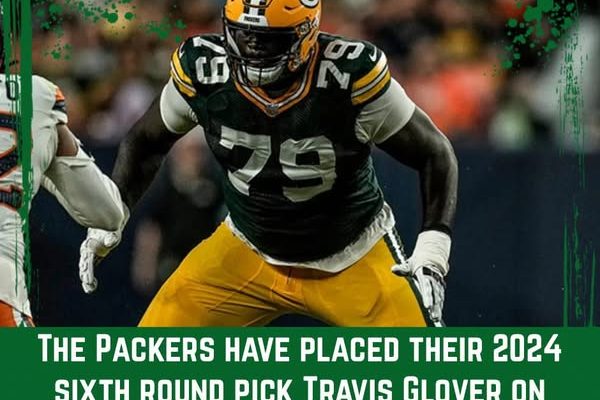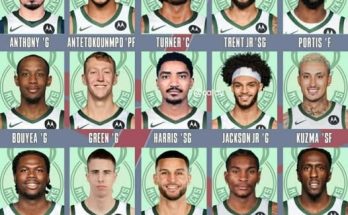The Green Bay Packers have suffered a significant setback ahead of the upcoming NFL season as offensive lineman Travis Glover has officially been placed on Injured Reserve, effectively ending his 2025 campaign before it even begins. For a team poised to take another step forward in the post-Aaron Rodgers era, the loss of a promising and versatile lineman like Glover casts a long shadow over their depth chart and overall aspirations. While Glover was not yet a household name, his importance to the Packers’ plans for offensive line stability and flexibility was growing rapidly. His absence will force head coach Matt LaFleur and the front office to scramble for solutions in both scheme and personnel, and the timing could not be worse as the team ramps up preparations for a highly competitive NFC North race.
Travis Glover was viewed by many within the organization as one of the team’s most valuable developmental pieces along the offensive line. Drafted for his size, athleticism, and raw potential, Glover was quickly working his way into the conversation for meaningful snaps, particularly as injuries and age continue to affect some of the team’s veterans. At 6-foot-6 and over 330 pounds, Glover provided the type of physical presence and upside that general managers dream of developing into a long-term anchor. He had shown flashes of dominance in offseason workouts and was expected to compete heavily in training camp, perhaps even cracking the two-deep rotation or rotating in as a swing tackle or guard depending on the opponent.
That’s why the announcement of his placement on Injured Reserve came as such a gut punch. Though the specifics of the injury have not yet been fully disclosed, reports suggest it could be a significant lower-body injury suffered during early camp drills. Given the nature of offensive line play — which requires explosive leg drive, leverage, and constant lateral movement — even a moderate injury can have serious implications for long-term performance. By placing Glover on IR now, the Packers have made it clear that this is not a short-term recovery timeline. He will be sidelined for the duration of the season, losing out on valuable reps, development, and an opportunity to entrench himself within the unit’s core.
The ripple effects of Glover’s absence cannot be overstated. The Packers’ offensive line has long been a strength of the franchise, even as the team has transitioned quarterbacks and dealt with changes at the skill positions. Anchored by All-Pro left tackle David Bakhtiari — whose own health has been a lingering question mark in recent years — the line has had to balance consistency with adaptability. The interior of the line remains solid with names like Elgton Jenkins and Josh Myers, but depth has always been a concern, especially at tackle. That’s where Glover was seen as a safety net, and now that safety net has vanished.
Depth on the offensive line is not just about injury protection; it’s also about scheme flexibility. LaFleur’s offense thrives on motion, timing, and zone-blocking schemes that require linemen to move fluidly and quickly upfield. Glover, despite being a rookie, possessed the athleticism and football IQ to grow into that role. His footwork and ability to mirror defenders in pass protection were steadily improving, and he had already begun mastering some of the calls and signals that are vital for pre-snap adjustments. Losing a player like that — one who was trending upward — means the coaching staff must either lean more heavily on untested talent or ask older veterans to take on a larger burden, potentially risking their own durability.
This development is also a sobering reminder of how fragile careers can be in the NFL. For Travis Glover, the 2025 season was supposed to be a launching pad, a chance to prove that he could translate his collegiate success and raw tools into professional productivity. Instead, he will spend the year rehabbing, learning from the sidelines, and watching as others compete for the opportunity he worked so hard to earn. Mentally and emotionally, such a setback can be daunting for a young player, especially one trying to establish himself in a league where roster spots are fiercely competitive and short memories often rule the day.
Still, the Packers have built a culture of resilience, and they’ll now need to lean on that culture more than ever. General manager Brian Gutekunst and his personnel staff will undoubtedly be looking into external options, scouring waiver wires, trade markets, and practice squads for additional depth. The offensive line is not a position group where teams can afford to stand pat, especially when aiming for playoff contention. Whether it’s adding a veteran with starting experience or promoting someone from within, the Packers must act quickly to shore up their front line before injuries mount further or weaknesses become glaring.
In the meantime, players like Rasheed Walker, Caleb Jones, and Luke Tenuta may see an uptick in reps and responsibilities. All have shown promise in limited action, but none carry the same upside Glover did coming into this season. Walker, in particular, may now find himself locked into a crucial swing tackle role — one that requires him to be ready at a moment’s notice for either side of the line. The learning curve is steep, but necessity often accelerates development, and that may be the silver lining in this otherwise disheartening news.
Another dimension to consider is the impact this has on quarterback Jordan Love. Entering a pivotal season where expectations are higher than ever, Love needs stability in front of him. With more freedom being given to him in the offense and a talented corps of young receivers, the margin for error along the offensive line becomes even thinner. Protection breakdowns, especially on the edge, can derail drives, kill momentum, and increase turnover risk. Glover may not have been the starting left or right tackle, but his presence on the depth chart was a contingency plan that gave coaches peace of mind. Without him, the Packers must hope their first unit stays healthy and that the backups can rise to the challenge.
It’s also worth noting that Glover’s injury could reshape the Packers’ strategy heading into the season regarding roster construction. Do they now keep an extra lineman on the 53-man roster? Do they prioritize linemen on the practice squad? Do they look at adjusting the blocking scheme to mask potential weaknesses? These are not minor tweaks — they could have ripple effects on personnel decisions at other positions, especially if the Packers feel the need to carry more bodies on the offensive line to compensate for Glover’s loss.
Beyond the Xs and Os, the locker room reaction to Glover’s injury has reportedly been somber but supportive. Several teammates have spoken about his work ethic, positivity, and commitment to improving every day. For young players, earning the respect of veterans is no small task, and Glover had clearly done just that. His absence will be felt not just on the field but in the daily rhythm of practice and preparation. Leadership is often thought of in terms of captains and stars, but every locker room needs grinders like Glover — players who bring effort and focus whether they’re starting or fighting for a role.
Fans too had begun to invest in Glover’s story. Social media and Packers forums were buzzing with optimism about his development during OTAs and minicamps. His background, including a strong college career and underdog draft profile, made him easy to root for. While his season may be lost, the long-term belief in his potential should not be. The Packers are known for developing linemen over time, and if Glover can return healthy next year, there’s every reason to believe he can still become a valuable piece of the team’s future.
Injuries are part of football, but they always feel more tragic when they involve a young player with so much ahead of him. The Green Bay Packers must now regroup, adjust, and move forward, but the loss of Travis Glover lingers as a reminder of how quickly things can change in the NFL. It’s a cruel twist for a player who was on the verge of taking the next step, and a difficult obstacle for a team that prides itself on preparation and development. Whether Glover returns stronger in 2026 remains to be seen, but one thing is certain — his 2025 season is over, and the Packers are left with a gap they must now scramble to fill.



